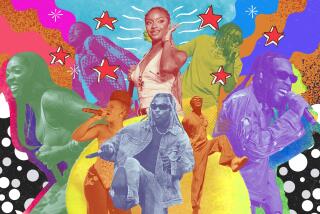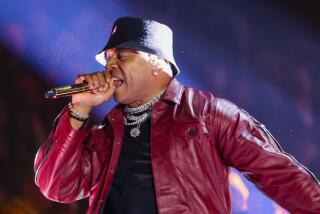Freedom’s enduring anthems
- Share via
There’s a good reason why Ladysmith Black Mambazo has become one of the most honored of world music ensembles. The visibility of the South African a cappella vocal ensemble certainly benefited from its participation in Paul Simon’s 1986 “Graceland” album. And it hasn’t hurt that it’s also performed before both the pope and Queen Elizabeth II.
But what makes Ladysmith (which won a Grammy on Sunday for world music album) so special is neither the pop credibility gained from the Simon association nor the royal and papal appearances. It is, instead, the manner in which the group’s presentation speaks for South Africa and its people. All of which made its program at UCLA’s Royce Hall on Saturday, celebrating more than a decade of South African freedom from apartheid, such a special event.
The eight singers produce a warm, deep sound, often delivered with a crisp rhythmic sense. Virtually every song is based on characteristic African call-and-response in which lead singer and Ladysmith founder Joseph Shabalala weaves through hypnotically repetitive vamp patterns and the harmonies of Christian hymns and gospel.
It is music rooted in isicathamiya, which means “to walk or step lightly on one’s toes” -- the late-night singing style of the workingmen in the South African mines of the ‘50s. In Shabalala’s own aural vision, it is enhanced by interjected chirping sounds, buoyant good humor and the lithe dance steps of the singers, most of whom are Shabalala family members.
Despite its status as one of the principal forces in South African music, Ladysmith still performs with an irresistible, passionate intensity. Singing material from throughout its lengthy career, the ensemble alternated humorous rhythm numbers enhanced by high-kicking dance steps with darker-toned, more introspective songs.
Most of the music seemed to have a layered, thoughtful subtext that was not always present in Ladysmith’s earlier works, perhaps a reflection of the apartheid observance (marking the 1994 South African elections), as well as the unsolved murders in the past three years of two family members -- Shabalala’s wife, Nellie, and his brother, Ben.
The concert opened with a solo set by singer-guitarist Vusi Mahlasela, who first came to the attention of Western audiences with his soulful singing in “Amandla!,” a film about the role of music in the anti-apartheid struggle. His engaging blend of voice and guitar, his gripping songs and his amiable stage manner merit far wider visibility.
More to Read
The biggest entertainment stories
Get our big stories about Hollywood, film, television, music, arts, culture and more right in your inbox as soon as they publish.
You may occasionally receive promotional content from the Los Angeles Times.







